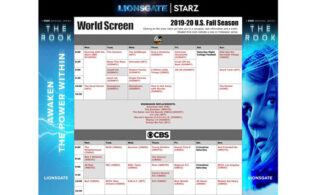LOS ANGELES: High-concept experiments, comedies about homebodies, spin-offs and reboots, time-travel adventures and tested procedurals—all await the almost 2,000 international TV executives flocking right now to Tinseltown for the annual marathon known as the L.A. Screenings.
To wit, Downward Dog (one of three high-concept contenders) boasts a talkative canine, Kevin Can Wait milks laughs at the expense of a stay-at-home dad (played by Kevin James) who is in-over-his-head; Blacklist has spawned progeny in Redemption as has 24 with Legacy, while a half-dozen movie makeovers include Lethal Weapon, Taken and Training Day; Time After Time, Timeless and Making History all fiddle with the chronological clock. And NBC is strutting yet another Chicago-set procedural, this one a legal installment, from producer Dick Wolf, while Mark Gordon has secured two more slots with Conviction and Designated Survivor, both for ABC.
The week-long event (approximately May 22 to 27) is the first chance each year for programmers around the world to assess the new American broadcast series for the fall season. In so doing, they traipse in groupings as large as 350 or 400 daily to one or another major Hollywood studio lot for day-long screenings, and then on to cocktail parties and fancy dinners before comparing notes with their teammates back in their hotel rooms. Then they do it all over again for five or six days. Some of them sign on the spot for something they must have or ink renewals on a long-standing output deal; others take their chances by waiting until they know more about the story arcs of series they’re interested in or until the first ratings data Stateside come in.
The informally organized extravaganza officially kicks off Sunday evening with Disney’s so-called International Upfronts, in which that company’s TV chieftains will unveil their upcoming slate (including tentpole movies as well as the latest series for ABC). Buyers fan out over the subsequent five days to visit all the Big Six major studios and likely a handful of indie suppliers like Lionsgate, Legendary, MGM and DreamWorks.
To some extent the pitches by the international divisions of the studios to overseas clients will mirror the just-wrapped Advertiser Upfronts in New York—except that these visitors have come to license series rather than just put blurbs in them.
With most markets (other than Greece, Venezuela and Russia) having recovered from the worldwide recession and key European station groups like ITV, ProSiebenSat.1 and Mediaset posting better quarterly numbers, expect the appetite for U.S. shows to be healthy. Especially since the just-concluded broadcast season was mostly a dud. Only Blindspot and Quantico qualify as freshman hits. Thus, there’s a fair amount of retooling at the different networks, especially at ABC and FOX. (The young-skewing The CW under president Mark Pedowitz is tinkering the least, adding only three new entrants: a take on the Archie Comics called Riverdale, the apocalypse romance No Tomorrow and supernatural detective caper Frequency. CBS’s Supergirl has flown over to round out The CW’s slate.)
Needless to say, the 42 prime-time contenders unveiled at the Advertising Upfronts in New York City this week (down from 47 last year) are each hoping to become the kind of breakout that makes it to five or seven or even ten seasons. And that do a similar job for their foreign acquirers by filling out their homegrown schedules with something fresh, edgy, addictive and above all, durable.
So far—and early buzz can be dangerously misleading—the newcomer series that have registered with a trio of disparate buyers who stopped off on their travels for the Upfront presentations in New York include Designated Survivor, toplining Kiefer Sutherland, co-produced by up-and-coming indie Entertainment One; Lethal Weapon, to air on FOX but licensed by Warner Bros.; Blacklist: Redemption, to air on NBC but licensed by Sony, and dramedy This Is Us, also for NBC.
Caveat: last year, many foreign buyers warmed to the sizzle reels for The Muppets, Limitless, Grinder and Heartbeat, all of which were eventually axed by their respective networks. Then, unfortunately, six very solid performers, as in The Good Wife, Castle, Person of Interest, Mike & Molly, Nashville and CSI: Cyber, have just aired their final episodes or had their plugs inadvertently pulled. The latter’s exit from the scene ends the extraordinary global run of the forensics quartet of CSIs (as in Vegas, New York and Miami), and closes out one of the most profitable chapters in CBS’s history of asset deals abroad.
Not to over-angst.
Established or budding franchise builders abound among American producers, some of whom play an outsized role in setting the tone of their respective networks, as well as reliably filling a number of key slots: Gary Glasberg masterminds the NCIS trio at CBS; Shonda Rhimes dominates Thursdays on ABC and will “do” Shakespeare at midseason with Still Star-Crossed, Greg Berlanti provides The CW its comic book-inflected look and feel, his latest being Riverdale; Wolf continues (and continues) as NBC’s go-to guy with the launch of Chicago Justice, and at FOX Lee Daniels’s Empire has a chance to expand with the upcoming Star, also for midseason. Not to mention on the sitcom side the prolific Chuck Lorre, who is based at Warner Bros., and, even with the unceremonious demise of Mike & Molly, still fields two top-rated sitcoms on CBS, as does similarly the duo of Phil Lord and Chris Miller, who scored with two pickups at FOX: Making History and Son of Zorn.
To be sure, for the foreign contingent, comedies tend to be more difficult to assess or appreciate at one sitting, but many international buyers undoubtedly would like to get their hands on the next Big Bang Theory or 30 Rock. (Early buzz on comedies from overseas folks who stopped off in NYC: NBC’s Great News, which claims Tina Fey as a producer, CBS’s aforementioned comedy with Kevin James, and the live action/animation hybrid for FOX, Son of Zorn.)
Although all the major buyers in Europe and elsewhere now generally control multiple outlets targeting different demos and constituencies, drama remains the genre that is most in demand as the best of the lot. NCIS now rules that stage, commanding the widest audiences around the globe and the most in advertising revenue.
“That’s one of the reasons that we wait as long as we can to make deals on new shows,” one buyer who didn’t wish to be named so as not to spoil his upcoming negotiations (and dinners with studio execs), told World Screen Newsflash. “It’s increasingly hard to gauge what will work, for which of our networks back home, and at what price. Plus, with so much more to choose from, from so many more producers popping up, making a choice is usually a painstaking process.”
Consider, for example, that the major studios generally screen one or two or more of their in-house produced cable shows, or, as in the case of CBS, execs will also likely tout their latest iteration of Star Trek and their Good Wife spin-off (toplining Christine Baranski), which are both destined for their CBS All Access service.
While precise figures are hard to come by, the international business for the Hollywood studios continues to be “fairly buoyant,” as one analyst put it, and it’s “absolutely crucial” to keep production deficits on series from ballooning. All-told, the Hollywood majors rake in from the business of licensing their content to foreign TV buyers, including to outlets in the three most lucrative markets of Canada, Germany and the U.K., “something in the range of $9 billion to $10 billion per year,” another analyst opined.
Some of those deals are multiyear volume arrangements whereby the foreign station group locks in the substantial majority of a particular Hollywood studio’s output for a three- to five-year period, while other deals are more ad hoc or piecemeal or even one-offs.
At the extremes: the three key commercial Canadian buyers—CTV, Global and City—divvy up the bulk of U.S. shows on the spot in L.A. at each Screenings; by contrast, British buyers, who largely eschew output deals, cherry-pick from among the U.S. hopefuls, often not closing on new freshman series until after several episodes have aired Stateside in the fall.
What buyers say they like, or disdain, may not necessarily be what they end up buying for their station back home. When queried, most, for example, say they love “smart, edgy fare” like, say, The Good Wife, Game of Thrones, The Americans or Billions, but, when push comes to shove, they may settle on a more traditional “broad appeal” show for their home audience like, say, Madam Secretary or Bones. And while most will also decry how derivative the Americans are for remaking movies or reviving small-screen classics, those will often end up being, if well executed, top of their shopping lists.
Eventually most all-new American broadcast series do seal deals with overseas terrestrial stations, and/or with online upstarts, but fewer Yank shows manage to secure prime-time berths abroad since local production has boomed in all major foreign countries. Still, series—especially hour-long dramas from the U.S.—are the widest-traveled content in the world, and still command top-dollar per episode. That could mean upwards of $1.5 million an episode from foreign buyers all-told for the handful of the very hottest U.S. shows each year.
So stay tuned.
Visit World Screen’s fall season grid here for synopses, trailers and a listing of new and returning shows by studio.




